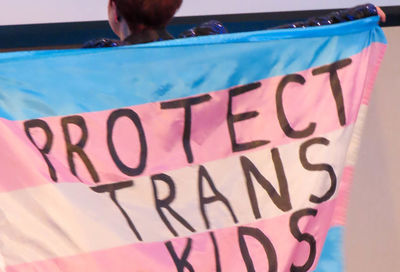Making the Grade
While it doesn't quite merit top marks, Easy A easily surpasses satisfactory
There can be an inherent danger in movie titles. It’s the risk of being saddled with a title that critics can easily twist around with a little wordplay to suit their needs. Take The Greatest, a limited-release film this year starring Pierce Brosnan, Susan Sarandon and Carey Mulligan. The film was fair at best, so resisting the urge to play off the title as a misnomer was impossible for most critics. And don’t get me started on Dumb and Dumberer.
Alas, such is the fate with Easy A. The film is quite funny, and the title is filled with double entendres, but it just doesn’t make the grade.

Easy A
Olive (Emma Stone) is your typical teenage scholastic overachiever. She’s not popular, she stays at home on the weekends to watch movies with Mom and Dad, and she’s awkward around boys. Need I mention that she’s a virgin? But what starts as a fib to her best friend (Alyson Michalka) becomes a school-wide rumor and scandal in minutes, thanks to text-happy teens and a Facebook-centric gossip mill. When Olive’s gay friend (Dan Byrd) asks her to pretend to have sex with him to bolster his ”straight” cred, she reluctantly agrees.
Of course, this leads to a whole spin on The Scarlet Letter, which Olive’s class just happens to be reading, and while Olive isn’t actually embracing any boys, she embraces her new pseudo-slut persona and aids many others in their reputation building. Since all lies get messy and have unintended consequences, Olive is going to pay a price. But will it cost her more than she’s made from the legions of nerds who have contributed to her coffers?
What elevates Easy A above most of the teen-comedy chaff out there is writer Bert V. Royal’s script. Clearly a child of the ’80s (with too many reverent references to that decade’s films to be anything else), Royal packs in jokes that are both funny and smart. Not all of them hit the mark, but there are enough to warrant repeated viewings. Royal frames the film as an online streaming broadcast that seems to wallow in the confessional reality of social media a bit too much, but something has to be done to rein in the plot when it goes astray. But, thankfully, grades aren’t given on midterms alone, and he pulls it out for the final.
One of the biggest stumbling blocks that director Will Gluck – whose previous film was the guilty pleasure about male cheerleaders, Fired Up! – has to deal with is the concept that teen sex is shocking and Olive is the only girl in her class doing it. What sort of Republican-designed universe is this? Fortunately Gluck compensates by plowing headfirst into the story and not looking back.




Starring
Emma Stone,
Dan Byrd
Rated PG-13
92 Minutes
Area Theaters
Several years ago, Lindsay Lohan’ would have played the lead role, but Stone (Zombieland) is able to provide a level of innocence required for Olive. She ensures that Olive is both sassy and sweet, and filled with more moxie than teachers twice her age. Yet the supporting cast almost gives you more to gab about than Stone. As Olive’s impossibly cool and hip parents, Stanley Tucci and Patricia Clarkson ruin the grading curve. Some of their scenes are completely extraneous and do little to advance the plot, but they’re such joys to watch it hardly matters. Thomas Haden Church and Lisa Kudrow play a married couple at Olive’s school, and their parts are also all too brief.
It’s the other teens in the film who almost fail. Amanda Bynes is too one-note with her virginal good-girl act, and Penn Badgley is really only funny when dressed as a woodchuck in the film. However, the one exception is Cougar Town‘s Byrd, who plays the gay teen in need of some anti-bullying help. His impassioned speech imploring Olive to help him turns the outlandish plot into something more real, more noble. Granted there’s a weird racial joke that threatens the credibility of the film to handle delicate topics, but even that elicits a laugh, so it gets a pass.
Many are going to compare Easy A to Mean Girls and find it lacking, but there’s a lot of potential here, so the learning curve won’t be that steep for the next film. In terms of a final grade, Easy A earns a solid B.
Support Metro Weekly’s Journalism
These are challenging times for news organizations. And yet it’s crucial we stay active and provide vital resources and information to both our local readers and the world. So won’t you please take a moment and consider supporting Metro Weekly with a membership? For as little as $5 a month, you can help ensure Metro Weekly magazine and MetroWeekly.com remain free, viable resources as we provide the best, most diverse, culturally-resonant LGBTQ coverage in both the D.C. region and around the world. Memberships come with exclusive perks and discounts, your own personal digital delivery of each week’s magazine (and an archive), access to our Member's Lounge when it launches this fall, and exclusive members-only items like Metro Weekly Membership Mugs and Tote Bags! Check out all our membership levels here and please join us today!




















